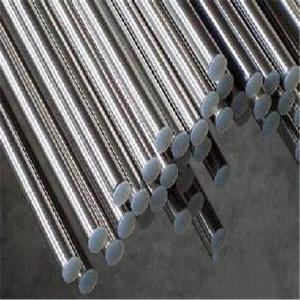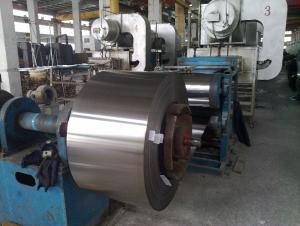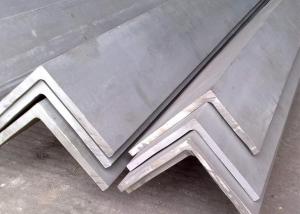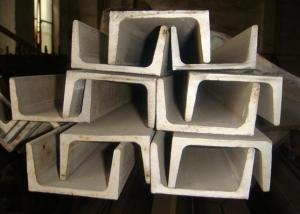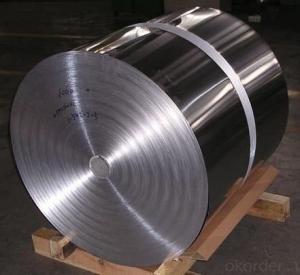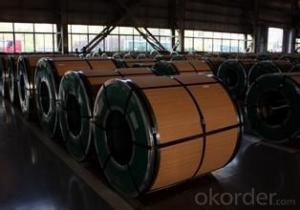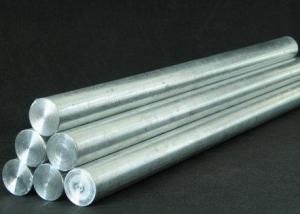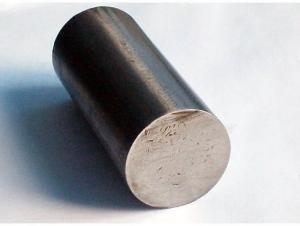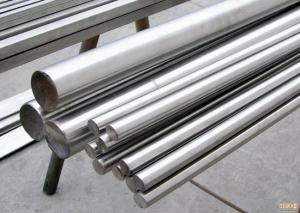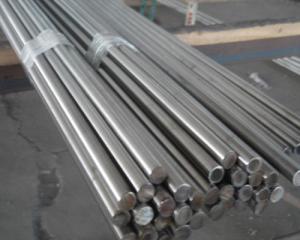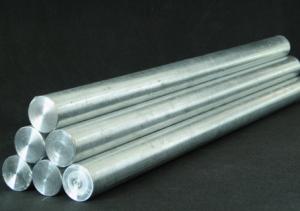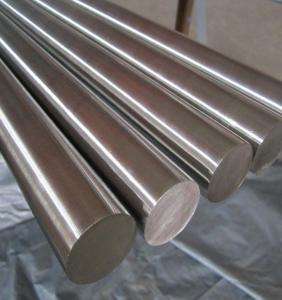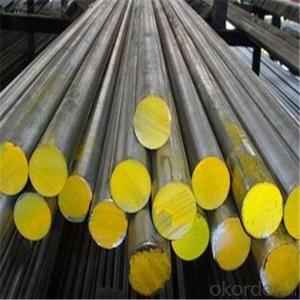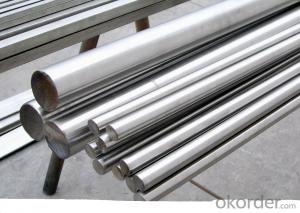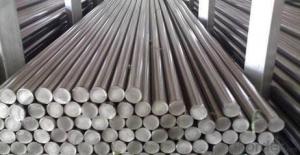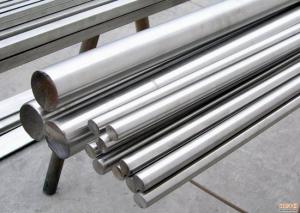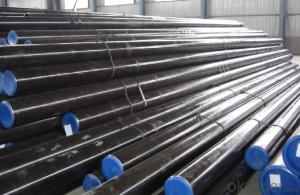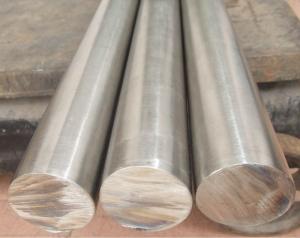Stainless Steel round bar with CE CertificateChina Supplier
- Loading Port:
- Shanghai
- Payment Terms:
- TT OR LC
- Min Order Qty:
- 5 m.t.
- Supply Capability:
- 5000 m.t./month
OKorder Service Pledge
OKorder Financial Service
You Might Also Like
Item specifice
China Supplier stainless steel round bar with CE Certificate
PRODUCT DESCRIPTION
Product Description
1, Diameter: 8mm-250mm rounds
5mm-9mm rods
2, Length: 2m, 3m, 5.8m, 6m or customized
3, Standard: GB, ASTM, AISI, SAE, DIN, JIS, EN
OEM technology - send detailed technical parameters for accurate quotation.
2, Produce Process: smelt iron - EAF smelt billet - ESR smelt billet -
hot rolled or forged to get the steel round bar and plate
3, Heat Treatment: annealing, normalizing, tempering, quenching
4, Surface Treatment: Black, Polished, Galvanized
5, Quality Assurance: We accept third party inspection for all orders.
You can ask testing organizations such as SGS, BV, etc. to test our products before shipping.
PRODUCTS SHOW
Products Show
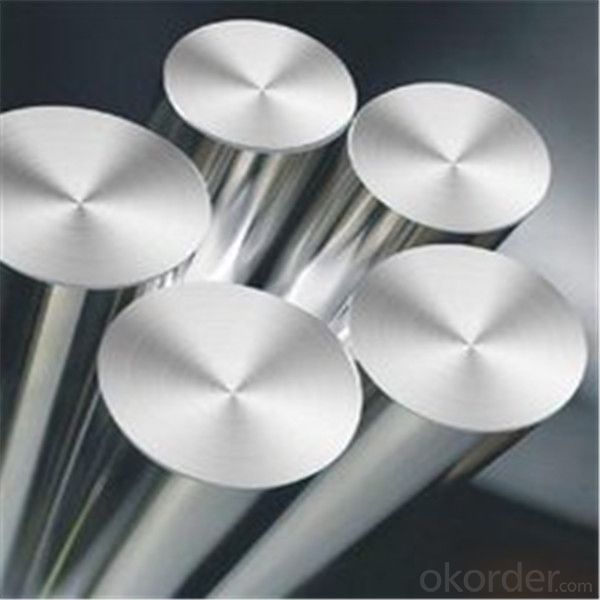
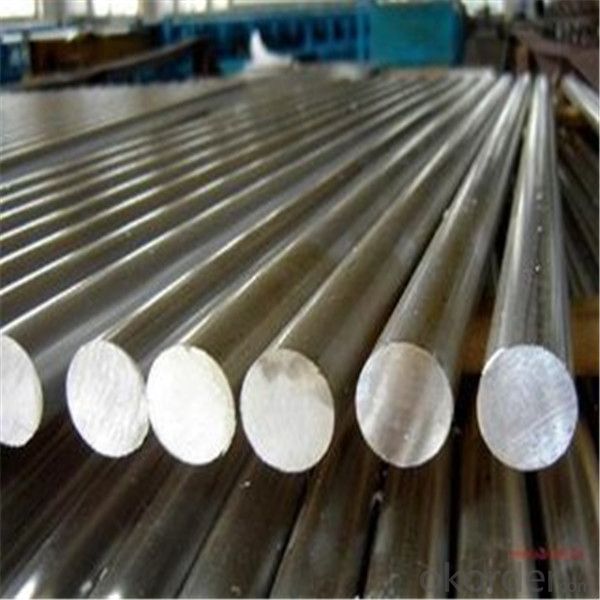
PRODUCTS&APPLICATION
Product Overviews
| Product Name | Typical Grades | Diameter(mm) | Standard adopted |
| Carbon Steel | 20 (1020/S20C/C22) | Ø16-Ø300 |
GB/SAE/JIS/DIN
|
| 40 (1040/S40C/C40) | |||
| 45 (1045/S45C/C45) | |||
| Bearing Steel | GCr9 (51100/SUJ1) | Ø12-Ø250 | |
| GCr15 (52100/SUJ2/100Gr6) | |||
| GCr9SiMn (A485-Gr.1/SUJ3) | |||
Cr-Mo Steel | 20Cr (5120/SCr420H/20Cr4) | Ø12-Ø250 | |
| 40Cr (5140/SCr440/41Cr4) | |||
| 42CrMo(4140/SCM440/42CrMo4) | |||
| Gear Steel | 20CrNiMo | Ø16-Ø600 | |
| 20CrMn(5115/SMnC420/20MnCr5) | |||
| 20CrNiMo(8620/SNCM220/20CrMiMo2) |
Application
| Carbon Steel | Mold bottom, Plastic mold, Construction machinery parts Automobile parts, Security grills, Screens, Construction |
| Bearing Steel | Aerospace, Navigation, Nuclear energy, Chemical industry Electronic information, Petrochemical, Instrument and meter Transportation |
| Cr-Mo Steel | Mechanism & Fasteners gear, Stressed components for vehicles Engines and machines, Parts of larger cross-section |
| Gear Steel | All kinds of gears, Statically and dynamically stressed component for vehicles Engines and machine, Larger cross-section parts, Crankshafts |
F A Q
FAQ
1, Your advantages?
professional products inquiry, products knowledge train (for agents), smooth goods delivery, excellent customer solution proposale
2, Test & Certificate?
SGS test is available, customer inspection before shipping is welcome, third party inspection is no problem
3, Payment Terms?
30% TT as deposit and 70% before delivery.
Irrevocable L/C at sight.
4, Trading Terms?
EXW, FOB, CIF, FFR, CNF
PACK & DELIVERY
Packaging & Delivery
1, Packaging: seaworthy package or as required
2, Delivery: 35-45 days or based on quantity
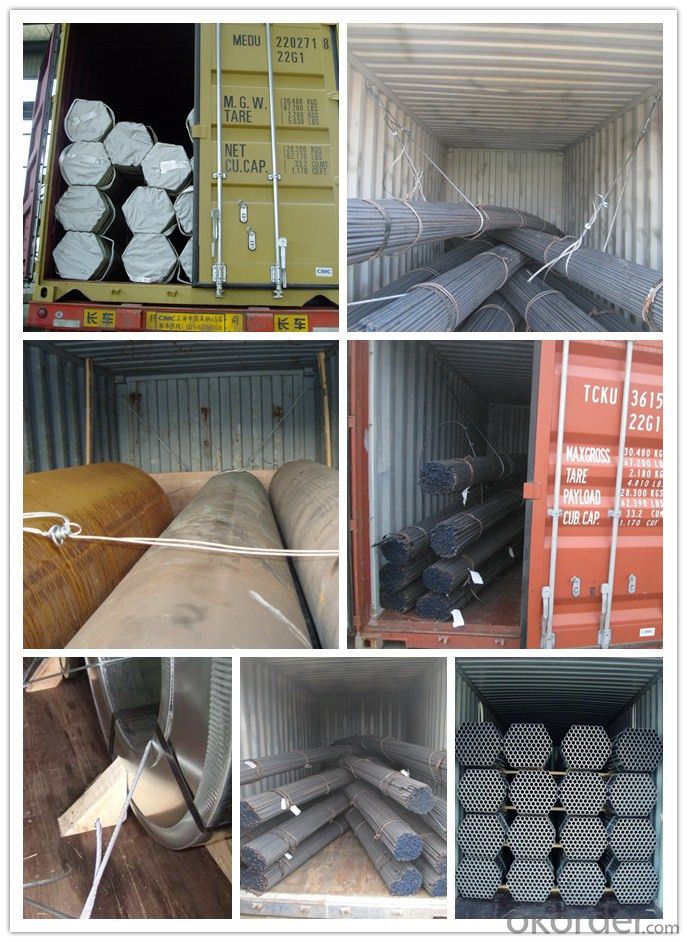
- Q:What are the different types of corrosion testing for stainless steel bars?
- There are several types of corrosion testing methods used for stainless steel bars, including salt spray testing, electrochemical testing (such as potentiodynamic polarization and cyclic polarization), immersion testing, crevice corrosion testing, and intergranular corrosion testing. These methods help evaluate the resistance of stainless steel bars to different forms of corrosion and determine their suitability for specific applications.
- Q:Can stainless steel bars be used in the food and beverage industry?
- Yes, stainless steel bars can be used in the food and beverage industry. Stainless steel is commonly used in food processing and handling equipment due to its corrosion resistance, hygienic properties, and ease of cleaning. It is a safe and durable material that meets the stringent hygiene and safety standards required in the industry.
- Q:Can stainless steel bars be used in water treatment applications?
- Indeed, water treatment applications can utilize stainless steel bars. Owing to its exceptional resistance to corrosion and rust, stainless steel proves to be a perfect fit for environments encompassing water and chemicals. In the realm of water treatment, it finds widespread application in processes like filtration, disinfection, and purification. Water treatment systems can employ stainless steel bars to fabricate an array of components, encompassing screens, tanks, pipes, and pumps. Its enduring nature and resistance to corrosion guarantee an extended lifespan and minimal maintenance needs, establishing it as a trustworthy option for water treatment applications.
- Q:How do you store stainless steel bars to prevent corrosion?
- To prevent corrosion and maintain the quality of stainless steel bars, proper storage is crucial. Here are some key steps to follow: 1. Keep the bars in a clean and dry environment: Moisture and dirt can accelerate the corrosion process. Store the stainless steel bars in a clean and dry area, away from any potential sources of moisture or humidity. Avoid storing them directly on the floor or near open windows or doors. 2. Use protective covers or wraps: To protect the stainless steel bars from dust, dirt, and potential chemical reactions, consider covering them with protective wraps or covers. This will act as a barrier and minimize the risk of corrosion. 3. Avoid contact with other metals: Stainless steel can undergo galvanic corrosion when it comes into contact with certain other metals. Prevent this by storing stainless steel bars separately from any other metals, especially those with different compositions or higher corrosion potentials. 4. Minimize exposure to chemicals: Stainless steel is generally resistant to many chemicals, but certain substances can cause corrosion. Keep the bars away from direct contact with chemicals such as acids, alkalis, and chlorides. If stored near chemicals, ensure proper ventilation and implement effective containment measures. 5. Maintain proper ventilation: Adequate airflow can prevent the buildup of moisture and humidity, reducing the chances of corrosion. If your storage area lacks natural ventilation, consider using fans or dehumidifiers to maintain a dry environment. 6. Regularly inspect and clean the storage area: Periodically inspect the storage area for any signs of leaks, moisture, or potential sources of corrosion. Keep the area clean, removing any debris or dust that may accumulate over time. By following these precautions and best practices, you can effectively store stainless steel bars to prevent corrosion and ensure their long-term durability and quality.
- Q:Are stainless steel bars suitable for hygienic applications?
- Hygienic applications can benefit from the suitability of stainless steel bars. This material is renowned for its exceptional resistance to corrosion, durability, and ease of maintenance, making it a popular preference across diverse industries such as food processing, pharmaceuticals, and healthcare. Stainless steel bars possess non-porous and smooth characteristics, rendering them impervious to bacterial growth and effortless to cleanse. They can endure high temperatures and harsh cleaning chemicals without compromising their properties, thereby ensuring a hygienic atmosphere. Furthermore, stainless steel is non-reactive, signifying that it does not release any harmful substances when in contact with products or materials. Furthermore, stainless steel bars boast an extended lifespan, diminishing the necessity for frequent replacements and minimizing the risk of contamination. They can also be fashioned into various shapes and sizes, allowing for adaptability in various hygienic applications. In conclusion, stainless steel bars are an exceptional option for hygienic applications due to their resistance to corrosion, durability, low-maintenance nature, non-reactive composition, and ability to withstand high temperatures and harsh cleaning chemicals. They not only provide a hygienic environment but also offer long-term value and reliability.
- Q:What steelmaking furnace for stainless steel bars?
- Stainless steel, whether they be plates or wires, is smelted the same way, but only after processing.
- Q:How do stainless steel bars resist stress corrosion cracking?
- Due to their distinct composition and properties, stainless steel bars exhibit resistance to stress corrosion cracking. Stress corrosion cracking refers to a specific type of corrosion that arises when both tensile stress and a particular corrosive environment are present. Stainless steel bars consist mainly of iron, with at least 10.5% chromium and other alloying elements like nickel, molybdenum, and titanium. The inclusion of chromium results in the formation of a protective passive layer called chromium oxide on the steel surface. This chromium oxide layer is highly stable and has the ability to self-repair, effectively preventing any further corrosion. Furthermore, the alloying elements in stainless steel enhance its resistance to corrosion and other forms of degradation. For instance, nickel enhances the strength and toughness of the steel, while molybdenum improves its resistance to pitting and crevice corrosion. The combined effect of these alloying elements provides an enhanced resistance to stress corrosion cracking. Moreover, stainless steel bars often undergo heat treatment to further enhance their resistance to stress corrosion cracking. Heat treatment processes like annealing, solution annealing, and stress-relieving can alter the microstructure of the steel, reducing the risk of stress corrosion cracking. Additionally, controlling the grain size and orientation through heat treatment can enhance the resistance of stainless steel bars to stress corrosion cracking. In conclusion, the unique composition, presence of a passive oxide layer, inclusion of alloying elements, and appropriate heat treatment contribute to the exceptional resistance of stainless steel bars against stress corrosion cracking. These properties make stainless steel bars the preferred choice for applications that involve exposure to harsh environments and high mechanical stresses.
- Q:What are the dimensional tolerances for stainless steel bars?
- The dimensional tolerances for stainless steel bars can vary depending on the specific grade and size of the bar. Generally, the dimensional tolerances for stainless steel bars are specified as per industry standards such as ASTM A276 or ASTM A484. For the diameter or size of the bar, the tolerance is typically specified as a plus or minus value. The tolerance can range from a few thousandths of an inch to a few hundredths of an inch, depending on the size and grade of the bar. For example, a 1-inch diameter stainless steel bar may have a tolerance of +/- 0.005 inches, while a 3/8-inch diameter bar may have a tolerance of +/- 0.002 inches. In addition to the diameter tolerance, other dimensional tolerances may also be specified for stainless steel bars. These can include straightness tolerance, which ensures that the bar does not have excessive bow or bend, and length tolerance, which specifies the allowable variation in the overall length of the bar. It is important to note that these tolerances are intended to ensure that the stainless steel bars meet the required dimensional specifications for their intended use. These tolerances may vary depending on the application and specific requirements of the customer. Therefore, it is always recommended to consult the relevant standards and specifications or discuss with the manufacturer or supplier to determine the exact dimensional tolerances for the specific stainless steel bars required.
- Q:Are stainless steel bars suitable for aerospace components?
- Yes, stainless steel bars are suitable for aerospace components. Stainless steel is known for its excellent corrosion resistance, high strength-to-weight ratio, and exceptional durability, making it a popular choice for various applications in the aerospace industry. These bars can be used to manufacture critical components, such as aircraft frames, landing gear, fasteners, engine components, and structural parts. Stainless steel's resistance to extreme temperatures and its ability to withstand harsh environments make it a reliable material for aerospace applications. Additionally, stainless steel bars can be easily machined and fabricated, allowing for intricate designs and precise manufacturing of aerospace components.
- Q:Are stainless steel bars suitable for the food processing industry?
- Stainless steel bars are an excellent choice for the food processing industry. They possess numerous positive qualities that make them popular in this field. Firstly, their resistance to corrosion is crucial in an environment where food and liquids are frequently present. This resistance ensures that the bars remain intact and hygienic for longer periods, reducing the risk of contamination and foodborne illnesses. Moreover, stainless steel bars are easy to clean and maintain, which makes them ideal for food processing facilities. They are non-porous, meaning they do not absorb bacteria, odors, or flavors, ensuring that they do not contaminate the food being processed. In addition, stainless steel bars have a high resistance to heat, allowing them to endure the rigorous heat treatment processes often required in the food industry. This heat resistance makes them suitable for grilling, baking, and boiling applications. Furthermore, stainless steel is a durable material that can withstand heavy usage and harsh cleaning chemicals without compromising its structure. This durability ensures that the bars maintain their shape and strength over time, reducing the need for frequent replacements and minimizing downtime in food processing operations. In conclusion, stainless steel bars offer the food processing industry a combination of corrosion resistance, cleanliness, heat resistance, and durability, making them highly suitable for use in this industry.
1. Manufacturer Overview |
|
|---|---|
| Location | |
| Year Established | |
| Annual Output Value | |
| Main Markets | |
| Company Certifications | |
2. Manufacturer Certificates |
|
|---|---|
| a) Certification Name | |
| Range | |
| Reference | |
| Validity Period | |
3. Manufacturer Capability |
|
|---|---|
| a)Trade Capacity | |
| Nearest Port | |
| Export Percentage | |
| No.of Employees in Trade Department | |
| Language Spoken: | |
| b)Factory Information | |
| Factory Size: | |
| No. of Production Lines | |
| Contract Manufacturing | |
| Product Price Range | |
Send your message to us
Stainless Steel round bar with CE CertificateChina Supplier
- Loading Port:
- Shanghai
- Payment Terms:
- TT OR LC
- Min Order Qty:
- 5 m.t.
- Supply Capability:
- 5000 m.t./month
OKorder Service Pledge
OKorder Financial Service
Similar products
New products
Hot products
Hot Searches
Related keywords
